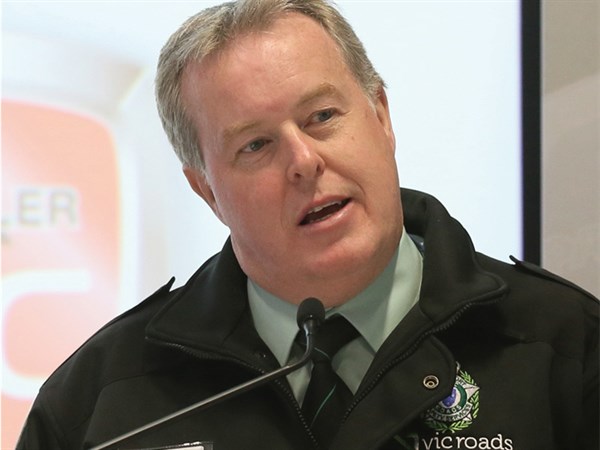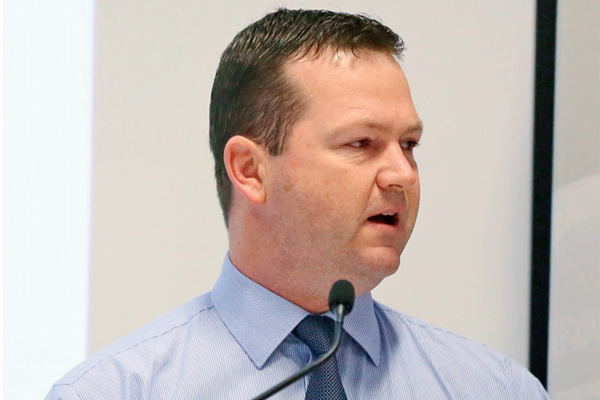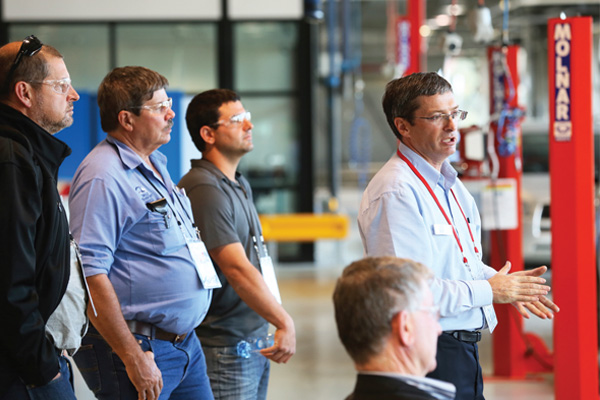The topic of brakes is always high on the agenda of enforcement officers in Australia
It’s always nice to see a roadside enforcement officer with a sense of humour. Russell Greenland from VicRoads is one such officer.
He’s seen rust so bad in the cab of some trucks that “it’s a bit like the Flintstones — the feet go through the floor”.
Greenland also paints an amusing mental picture of a Victorian farmer once caught trundling down a public road using a pair of multi-grips as a steering wheel in his old truck.
That reminds me of a farm fire truck I once saw. It had a milk crate for a seat.
The tray was so bowed in the middle, with a giant water tank weighing down on its couple of remaining boards, that both the front and rear wheels were hardly touching the ground.
Anyway, in rundown rigs like these, you’d wonder how well or otherwise the brakes work.
This is where Greenland’s technical and maintenance knowledge comes into play.
VicRoads’ brake maintenance disappointment
Greenland (above) is metropolitan manager of transport safety services with VicRoads, and was one of the keynote speakers at a fascinating session ‘What the Inspectors See’ at the 2014 Australian Trucking Association (ATA)/Paccar Technical and Maintenance Conference (TMC).
The road to acquiring the roller tester began in 2010, when VicRoads, which doesn’t have an annual roadworthiness inspection regime, had a lot of complaints from industry itself about the quality of Victoria’s trucks in general.Greenland says VicRoads is so concerned about brakes it has re-instated its own brake roller tester for the first time in 15 years.
“Since 2010, we started to get quite concerned in relation to the state of the fleet,” Greenland says.
“We ran a number of operations, basically in the metro south-east region.
“The first one was really disappointing … 90 per cent of the vehicles we inspected with the brake roller test trailer we hired in for a week, failed — with a high percentage of major defects.
“We ran a second operation about three months later because we thought the figures from the first one may have been a bit of an anomaly — [and] came up with about an 85 per cent fail rate.
“Then we ran a third one in about November of the same year and had the same 80 to 85 per cent fail rate.
“It did actually vary from area to area but that was pretty alarming.”
So alarming that Operation Trishula followed in 2012 and 2013 in conjunction with the Police and Worksafe, in a dozen Victorian locations with a ‘huge’ number of vehicles inspected — and an overall fail rate of 70 per cent.
“Since Operation Trishula … we’ve now put a specialist mechanical group together and we’ve just leased for the time being a second-hand brake roller tester trailer, which we are getting ready to use,” Greenland says.
He laments that a lot of the mechanical defects that inspectors find “is stuff that mechanics who crawl underneath should actually find.
“Sometimes we look but we just don’t see, from an industry point of view.”
Brake enforcement rollout from Victoria to NSW
Brakes are also a “heavy focus” of compliance in New South Wales, Roads and Maritime Services (RMS), statewide operations manager Brett Patterson (above) says.
That means all too often finding things such as: brakes over-stroking and not contacting the drum; broken drums; cracked rotors; brake boosters broken off; “or we can see that the brake pad is just gone, so metal to metal”.”Whether it’s using the visual inspection, whether it’s using the roller brake testing machines, we are able to see if the brakes are in operation,” Patterson says.
Speaking of brake roller testers, it’s not just the heavy vehicle authorities who now have them.
“I’m very fortunate I have brake roller testers and in all honesty they are the best piece of equipment you could possibly get in a fleet,” Lance Fisher, fleet maintenance manager with Sydney-based operator John L Pierce, says.
“I’ve got another one coming, but I’ve got to tell you, they’re worth their weight in gold.
“To be able to take a lot of onus off the person or people … and to be able to put a print out on the service sheet and to be able to attach that to the files and records [is great].
“Straightaway a calibrated machine has told me all the brakes on the combination are safe; so poor old second-year apprentice is not getting a ream for something he wasn’t sure of, or didn’t do.”
Refreshing brake maintenance knowledge
Meanwhile, a separate session at the TMC was titled ‘Brushing up on Brake Maintenance’.
Ian Thomson (above, right) is engineering manager with BPW Transpec, a member of the Australian Road Transport Suppliers Association (ARTSA), a joint organiser of the TMC.
Thomson stresses the simple importance of keeping brake systems clean.
This can be as basic as: regularly draining the air tanks; ensuring you have dust covers to keep abrasive grit away from the drum shoes; keeping air lines out of the dirt and grease; and having drivers wipe these clean.
Trailer couplings are potentially a source of contamination which can cause valves further along the system to fail because debris gets caught and they no longer seat properly.
Oil and other liquid contaminants can cause seats to swell and also not seal properly; and excess sealant or Teflon tape can also prevent valves sealing properly.
Thomson says the typical pneumatic brake circuit doesn’t have any in-line filters —in the relay valves, park brake valves and brake boosters.
“People seem to think that because these valves are fairly inexpensive to replace, they do away with the need for filters — they just let the system cop it and when things go bad, change the valves out,” he adds.
“That’s been changing quite a lot with the introduction of ABS/EBS [electronic braking system] where the valves you need to replace are quite a lot more expensive, so you go from changing what might be a $150 valve to one that might be $1,500.”
Thomson advocates brake supply line filter strainers to stop dust and corrosion from the supply lines getting into the valves and tanks.
He says there are also EBS valve service kits costing between $150 and $200 that can also save a lot of money.
BPW recommends a complete operational service check of brake systems every three months or 40,000km.








